Britannia Hotel: Macro Environment and Strategic Management Report
VerifiedAdded on 2023/06/09
|11
|3610
|215
Report
AI Summary
This report offers a detailed strategic analysis of Britannia Hotel, a British hotel group. It begins with an introduction to business strategy in the hospitality industry and then examines the macro environment using PESTEL and SWOT analyses, assessing political, economic, social, technological, environmental, and legal factors. The report then delves into the internal environment and capabilities of Britannia Hotel, applying the McKinsey 7S model to assess strategy, structure, systems, skills, style, staff, and shared values. Porter's Five Forces model is used to analyze competitive forces. The report evaluates internal strengths and weaknesses, and identifies market opportunities and threats. Finally, it applies a range of theories, concepts, and models to develop a strategic management plan with tangible and tactical objectives for Britannia Hotel. The conclusion summarizes the key findings and recommendations.
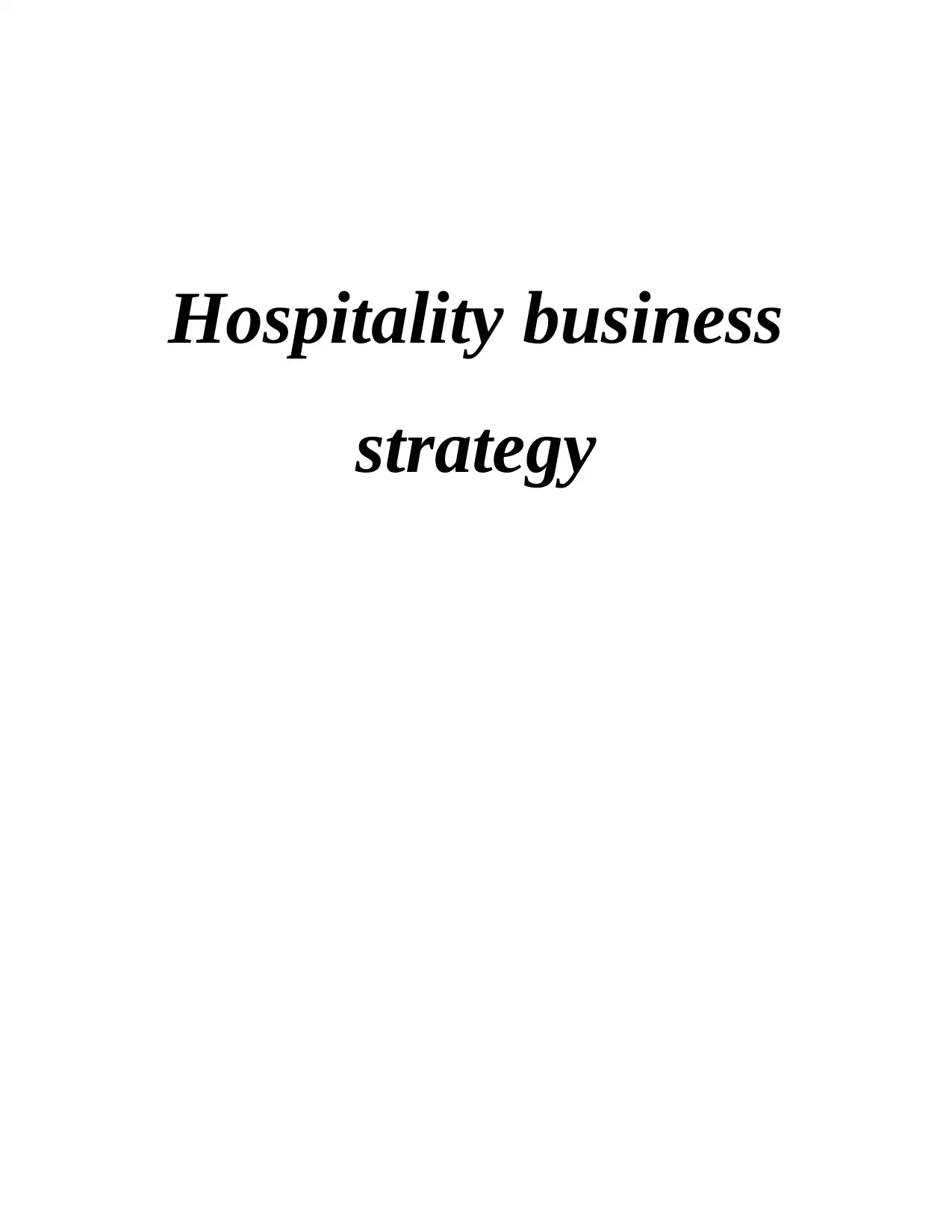
Hospitality business
strategy
strategy
Paraphrase This Document
Need a fresh take? Get an instant paraphrase of this document with our AI Paraphraser
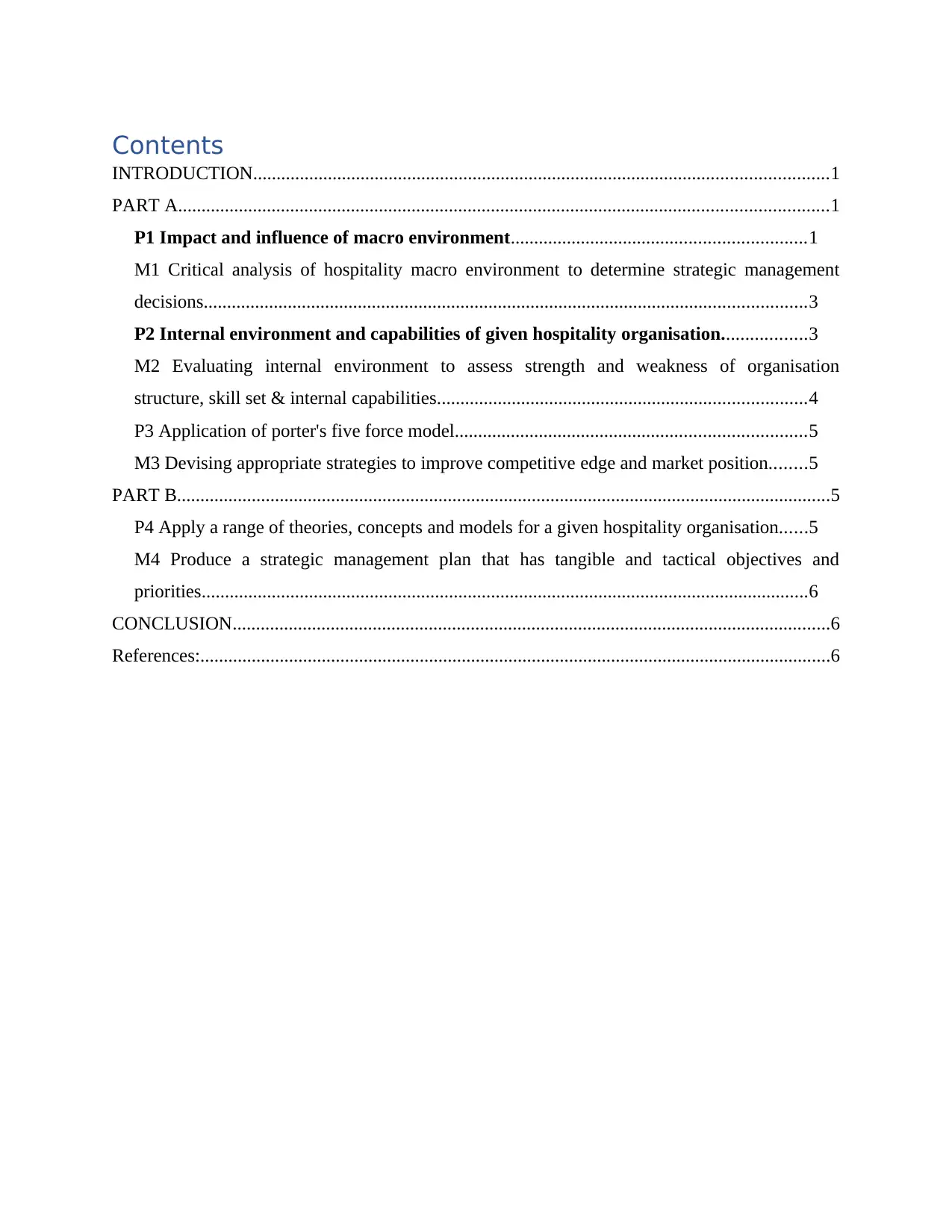
Contents
INTRODUCTION...........................................................................................................................1
PART A...........................................................................................................................................1
P1 Impact and influence of macro environment...............................................................1
M1 Critical analysis of hospitality macro environment to determine strategic management
decisions.................................................................................................................................3
P2 Internal environment and capabilities of given hospitality organisation..................3
M2 Evaluating internal environment to assess strength and weakness of organisation
structure, skill set & internal capabilities...............................................................................4
P3 Application of porter's five force model...........................................................................5
M3 Devising appropriate strategies to improve competitive edge and market position........5
PART B............................................................................................................................................5
P4 Apply a range of theories, concepts and models for a given hospitality organisation......5
M4 Produce a strategic management plan that has tangible and tactical objectives and
priorities..................................................................................................................................6
CONCLUSION................................................................................................................................6
References:.......................................................................................................................................6
INTRODUCTION...........................................................................................................................1
PART A...........................................................................................................................................1
P1 Impact and influence of macro environment...............................................................1
M1 Critical analysis of hospitality macro environment to determine strategic management
decisions.................................................................................................................................3
P2 Internal environment and capabilities of given hospitality organisation..................3
M2 Evaluating internal environment to assess strength and weakness of organisation
structure, skill set & internal capabilities...............................................................................4
P3 Application of porter's five force model...........................................................................5
M3 Devising appropriate strategies to improve competitive edge and market position........5
PART B............................................................................................................................................5
P4 Apply a range of theories, concepts and models for a given hospitality organisation......5
M4 Produce a strategic management plan that has tangible and tactical objectives and
priorities..................................................................................................................................6
CONCLUSION................................................................................................................................6
References:.......................................................................................................................................6
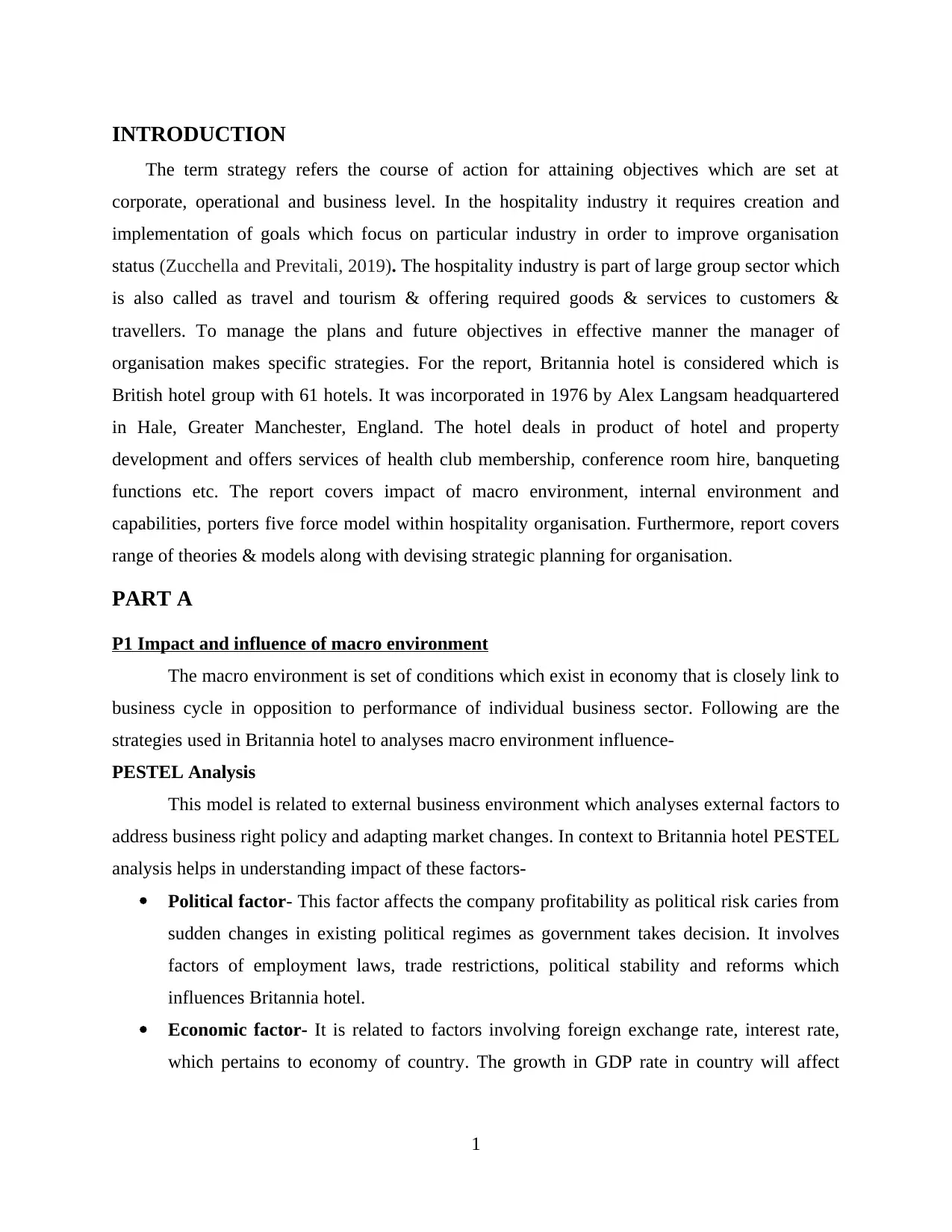
INTRODUCTION
The term strategy refers the course of action for attaining objectives which are set at
corporate, operational and business level. In the hospitality industry it requires creation and
implementation of goals which focus on particular industry in order to improve organisation
status (Zucchella and Previtali, 2019). The hospitality industry is part of large group sector which
is also called as travel and tourism & offering required goods & services to customers &
travellers. To manage the plans and future objectives in effective manner the manager of
organisation makes specific strategies. For the report, Britannia hotel is considered which is
British hotel group with 61 hotels. It was incorporated in 1976 by Alex Langsam headquartered
in Hale, Greater Manchester, England. The hotel deals in product of hotel and property
development and offers services of health club membership, conference room hire, banqueting
functions etc. The report covers impact of macro environment, internal environment and
capabilities, porters five force model within hospitality organisation. Furthermore, report covers
range of theories & models along with devising strategic planning for organisation.
PART A
P1 Impact and influence of macro environment
The macro environment is set of conditions which exist in economy that is closely link to
business cycle in opposition to performance of individual business sector. Following are the
strategies used in Britannia hotel to analyses macro environment influence-
PESTEL Analysis
This model is related to external business environment which analyses external factors to
address business right policy and adapting market changes. In context to Britannia hotel PESTEL
analysis helps in understanding impact of these factors-
Political factor- This factor affects the company profitability as political risk caries from
sudden changes in existing political regimes as government takes decision. It involves
factors of employment laws, trade restrictions, political stability and reforms which
influences Britannia hotel.
Economic factor- It is related to factors involving foreign exchange rate, interest rate,
which pertains to economy of country. The growth in GDP rate in country will affect
1
The term strategy refers the course of action for attaining objectives which are set at
corporate, operational and business level. In the hospitality industry it requires creation and
implementation of goals which focus on particular industry in order to improve organisation
status (Zucchella and Previtali, 2019). The hospitality industry is part of large group sector which
is also called as travel and tourism & offering required goods & services to customers &
travellers. To manage the plans and future objectives in effective manner the manager of
organisation makes specific strategies. For the report, Britannia hotel is considered which is
British hotel group with 61 hotels. It was incorporated in 1976 by Alex Langsam headquartered
in Hale, Greater Manchester, England. The hotel deals in product of hotel and property
development and offers services of health club membership, conference room hire, banqueting
functions etc. The report covers impact of macro environment, internal environment and
capabilities, porters five force model within hospitality organisation. Furthermore, report covers
range of theories & models along with devising strategic planning for organisation.
PART A
P1 Impact and influence of macro environment
The macro environment is set of conditions which exist in economy that is closely link to
business cycle in opposition to performance of individual business sector. Following are the
strategies used in Britannia hotel to analyses macro environment influence-
PESTEL Analysis
This model is related to external business environment which analyses external factors to
address business right policy and adapting market changes. In context to Britannia hotel PESTEL
analysis helps in understanding impact of these factors-
Political factor- This factor affects the company profitability as political risk caries from
sudden changes in existing political regimes as government takes decision. It involves
factors of employment laws, trade restrictions, political stability and reforms which
influences Britannia hotel.
Economic factor- It is related to factors involving foreign exchange rate, interest rate,
which pertains to economy of country. The growth in GDP rate in country will affect
1
⊘ This is a preview!⊘
Do you want full access?
Subscribe today to unlock all pages.

Trusted by 1+ million students worldwide
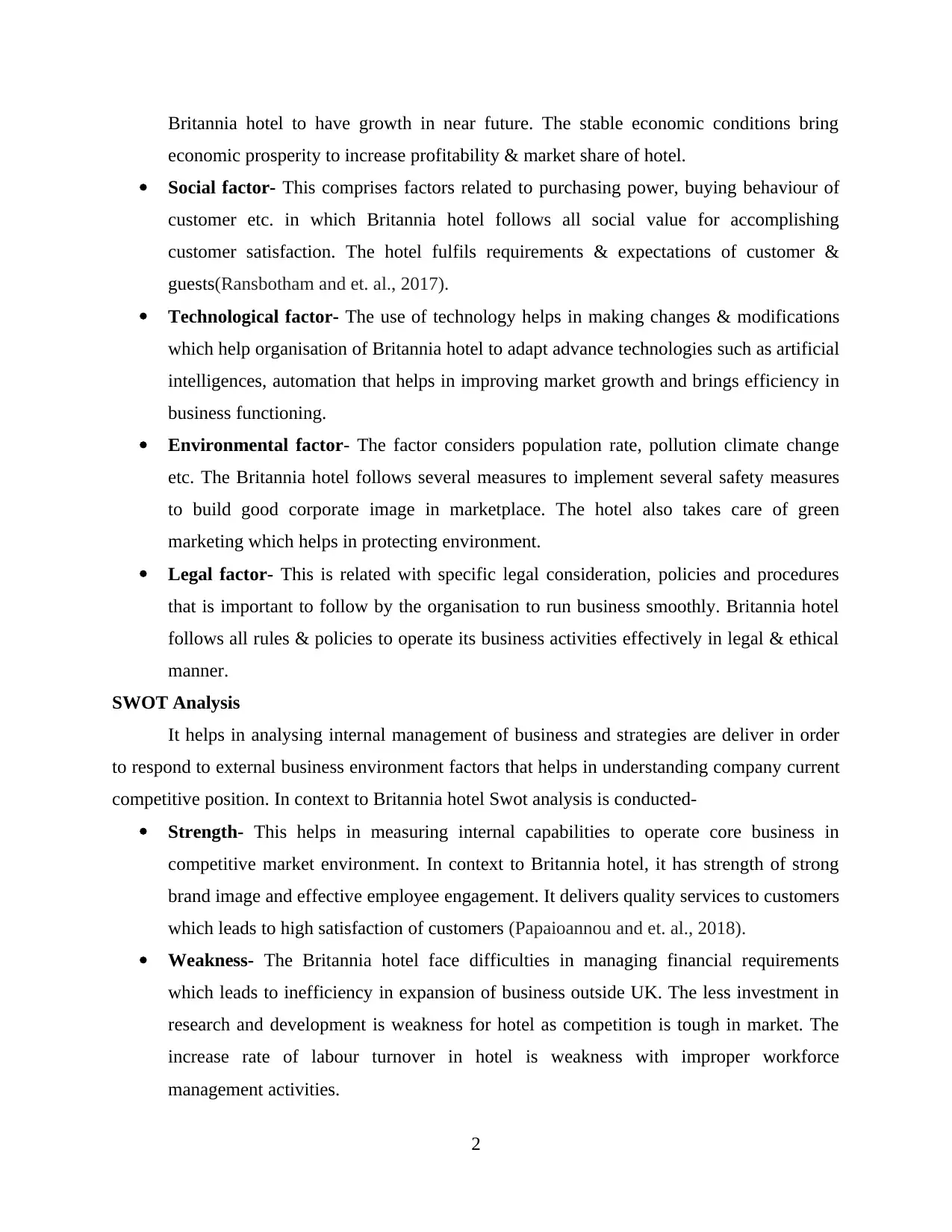
Britannia hotel to have growth in near future. The stable economic conditions bring
economic prosperity to increase profitability & market share of hotel.
Social factor- This comprises factors related to purchasing power, buying behaviour of
customer etc. in which Britannia hotel follows all social value for accomplishing
customer satisfaction. The hotel fulfils requirements & expectations of customer &
guests(Ransbotham and et. al., 2017).
Technological factor- The use of technology helps in making changes & modifications
which help organisation of Britannia hotel to adapt advance technologies such as artificial
intelligences, automation that helps in improving market growth and brings efficiency in
business functioning.
Environmental factor- The factor considers population rate, pollution climate change
etc. The Britannia hotel follows several measures to implement several safety measures
to build good corporate image in marketplace. The hotel also takes care of green
marketing which helps in protecting environment.
Legal factor- This is related with specific legal consideration, policies and procedures
that is important to follow by the organisation to run business smoothly. Britannia hotel
follows all rules & policies to operate its business activities effectively in legal & ethical
manner.
SWOT Analysis
It helps in analysing internal management of business and strategies are deliver in order
to respond to external business environment factors that helps in understanding company current
competitive position. In context to Britannia hotel Swot analysis is conducted-
Strength- This helps in measuring internal capabilities to operate core business in
competitive market environment. In context to Britannia hotel, it has strength of strong
brand image and effective employee engagement. It delivers quality services to customers
which leads to high satisfaction of customers (Papaioannou and et. al., 2018).
Weakness- The Britannia hotel face difficulties in managing financial requirements
which leads to inefficiency in expansion of business outside UK. The less investment in
research and development is weakness for hotel as competition is tough in market. The
increase rate of labour turnover in hotel is weakness with improper workforce
management activities.
2
economic prosperity to increase profitability & market share of hotel.
Social factor- This comprises factors related to purchasing power, buying behaviour of
customer etc. in which Britannia hotel follows all social value for accomplishing
customer satisfaction. The hotel fulfils requirements & expectations of customer &
guests(Ransbotham and et. al., 2017).
Technological factor- The use of technology helps in making changes & modifications
which help organisation of Britannia hotel to adapt advance technologies such as artificial
intelligences, automation that helps in improving market growth and brings efficiency in
business functioning.
Environmental factor- The factor considers population rate, pollution climate change
etc. The Britannia hotel follows several measures to implement several safety measures
to build good corporate image in marketplace. The hotel also takes care of green
marketing which helps in protecting environment.
Legal factor- This is related with specific legal consideration, policies and procedures
that is important to follow by the organisation to run business smoothly. Britannia hotel
follows all rules & policies to operate its business activities effectively in legal & ethical
manner.
SWOT Analysis
It helps in analysing internal management of business and strategies are deliver in order
to respond to external business environment factors that helps in understanding company current
competitive position. In context to Britannia hotel Swot analysis is conducted-
Strength- This helps in measuring internal capabilities to operate core business in
competitive market environment. In context to Britannia hotel, it has strength of strong
brand image and effective employee engagement. It delivers quality services to customers
which leads to high satisfaction of customers (Papaioannou and et. al., 2018).
Weakness- The Britannia hotel face difficulties in managing financial requirements
which leads to inefficiency in expansion of business outside UK. The less investment in
research and development is weakness for hotel as competition is tough in market. The
increase rate of labour turnover in hotel is weakness with improper workforce
management activities.
2
Paraphrase This Document
Need a fresh take? Get an instant paraphrase of this document with our AI Paraphraser
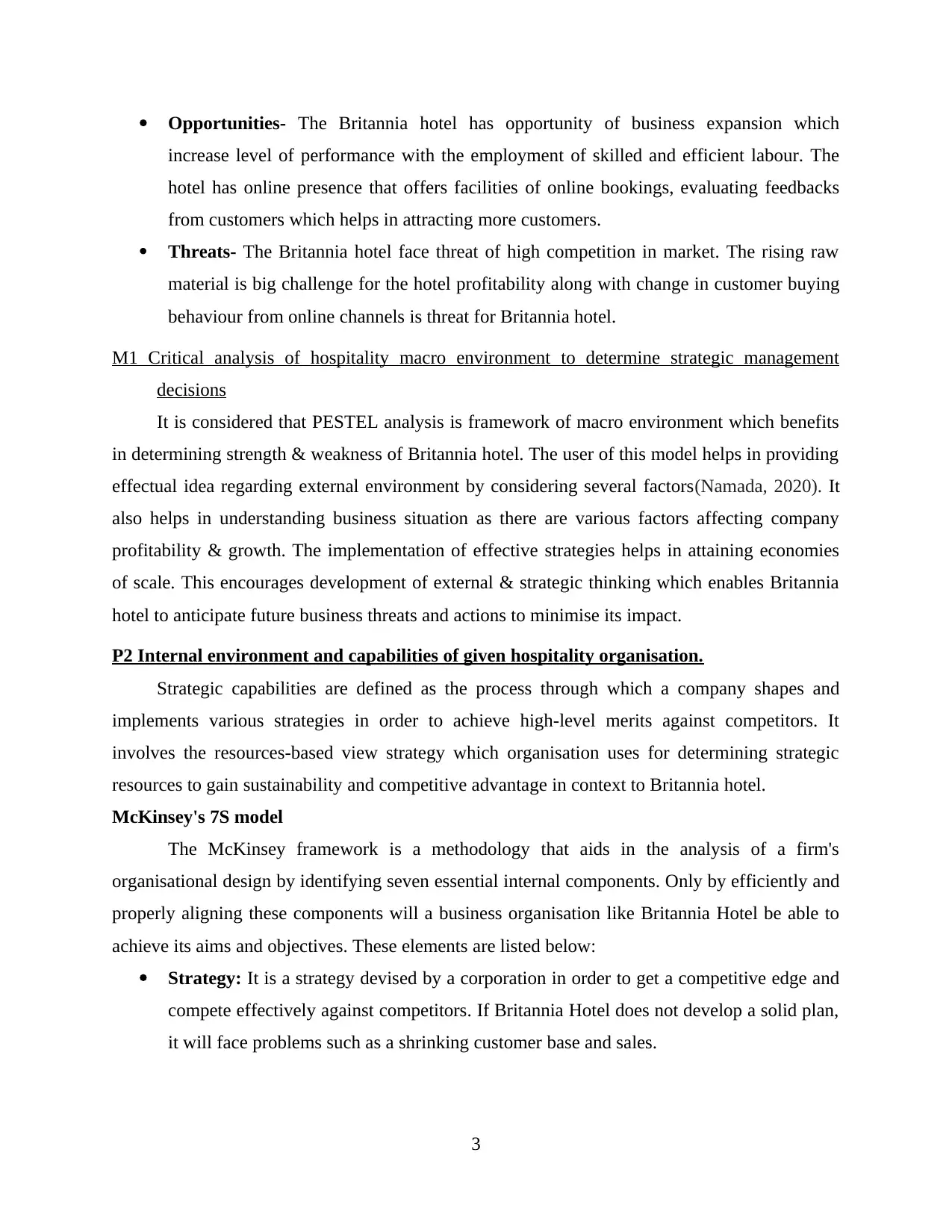
Opportunities- The Britannia hotel has opportunity of business expansion which
increase level of performance with the employment of skilled and efficient labour. The
hotel has online presence that offers facilities of online bookings, evaluating feedbacks
from customers which helps in attracting more customers.
Threats- The Britannia hotel face threat of high competition in market. The rising raw
material is big challenge for the hotel profitability along with change in customer buying
behaviour from online channels is threat for Britannia hotel.
M1 Critical analysis of hospitality macro environment to determine strategic management
decisions
It is considered that PESTEL analysis is framework of macro environment which benefits
in determining strength & weakness of Britannia hotel. The user of this model helps in providing
effectual idea regarding external environment by considering several factors(Namada, 2020). It
also helps in understanding business situation as there are various factors affecting company
profitability & growth. The implementation of effective strategies helps in attaining economies
of scale. This encourages development of external & strategic thinking which enables Britannia
hotel to anticipate future business threats and actions to minimise its impact.
P2 Internal environment and capabilities of given hospitality organisation.
Strategic capabilities are defined as the process through which a company shapes and
implements various strategies in order to achieve high-level merits against competitors. It
involves the resources-based view strategy which organisation uses for determining strategic
resources to gain sustainability and competitive advantage in context to Britannia hotel.
McKinsey's 7S model
The McKinsey framework is a methodology that aids in the analysis of a firm's
organisational design by identifying seven essential internal components. Only by efficiently and
properly aligning these components will a business organisation like Britannia Hotel be able to
achieve its aims and objectives. These elements are listed below:
Strategy: It is a strategy devised by a corporation in order to get a competitive edge and
compete effectively against competitors. If Britannia Hotel does not develop a solid plan,
it will face problems such as a shrinking customer base and sales.
3
increase level of performance with the employment of skilled and efficient labour. The
hotel has online presence that offers facilities of online bookings, evaluating feedbacks
from customers which helps in attracting more customers.
Threats- The Britannia hotel face threat of high competition in market. The rising raw
material is big challenge for the hotel profitability along with change in customer buying
behaviour from online channels is threat for Britannia hotel.
M1 Critical analysis of hospitality macro environment to determine strategic management
decisions
It is considered that PESTEL analysis is framework of macro environment which benefits
in determining strength & weakness of Britannia hotel. The user of this model helps in providing
effectual idea regarding external environment by considering several factors(Namada, 2020). It
also helps in understanding business situation as there are various factors affecting company
profitability & growth. The implementation of effective strategies helps in attaining economies
of scale. This encourages development of external & strategic thinking which enables Britannia
hotel to anticipate future business threats and actions to minimise its impact.
P2 Internal environment and capabilities of given hospitality organisation.
Strategic capabilities are defined as the process through which a company shapes and
implements various strategies in order to achieve high-level merits against competitors. It
involves the resources-based view strategy which organisation uses for determining strategic
resources to gain sustainability and competitive advantage in context to Britannia hotel.
McKinsey's 7S model
The McKinsey framework is a methodology that aids in the analysis of a firm's
organisational design by identifying seven essential internal components. Only by efficiently and
properly aligning these components will a business organisation like Britannia Hotel be able to
achieve its aims and objectives. These elements are listed below:
Strategy: It is a strategy devised by a corporation in order to get a competitive edge and
compete effectively against competitors. If Britannia Hotel does not develop a solid plan,
it will face problems such as a shrinking customer base and sales.
3
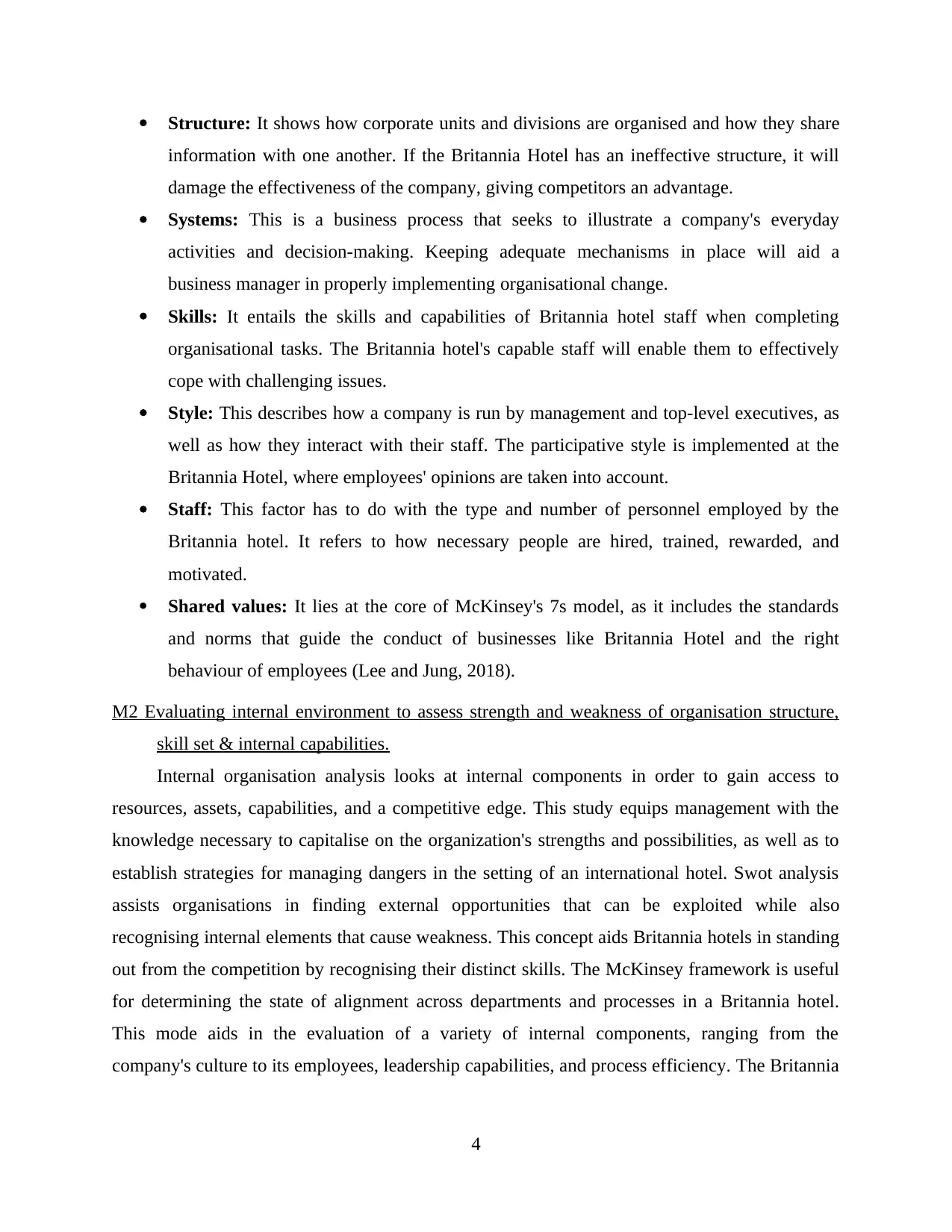
Structure: It shows how corporate units and divisions are organised and how they share
information with one another. If the Britannia Hotel has an ineffective structure, it will
damage the effectiveness of the company, giving competitors an advantage.
Systems: This is a business process that seeks to illustrate a company's everyday
activities and decision-making. Keeping adequate mechanisms in place will aid a
business manager in properly implementing organisational change.
Skills: It entails the skills and capabilities of Britannia hotel staff when completing
organisational tasks. The Britannia hotel's capable staff will enable them to effectively
cope with challenging issues.
Style: This describes how a company is run by management and top-level executives, as
well as how they interact with their staff. The participative style is implemented at the
Britannia Hotel, where employees' opinions are taken into account.
Staff: This factor has to do with the type and number of personnel employed by the
Britannia hotel. It refers to how necessary people are hired, trained, rewarded, and
motivated.
Shared values: It lies at the core of McKinsey's 7s model, as it includes the standards
and norms that guide the conduct of businesses like Britannia Hotel and the right
behaviour of employees (Lee and Jung, 2018).
M2 Evaluating internal environment to assess strength and weakness of organisation structure,
skill set & internal capabilities.
Internal organisation analysis looks at internal components in order to gain access to
resources, assets, capabilities, and a competitive edge. This study equips management with the
knowledge necessary to capitalise on the organization's strengths and possibilities, as well as to
establish strategies for managing dangers in the setting of an international hotel. Swot analysis
assists organisations in finding external opportunities that can be exploited while also
recognising internal elements that cause weakness. This concept aids Britannia hotels in standing
out from the competition by recognising their distinct skills. The McKinsey framework is useful
for determining the state of alignment across departments and processes in a Britannia hotel.
This mode aids in the evaluation of a variety of internal components, ranging from the
company's culture to its employees, leadership capabilities, and process efficiency. The Britannia
4
information with one another. If the Britannia Hotel has an ineffective structure, it will
damage the effectiveness of the company, giving competitors an advantage.
Systems: This is a business process that seeks to illustrate a company's everyday
activities and decision-making. Keeping adequate mechanisms in place will aid a
business manager in properly implementing organisational change.
Skills: It entails the skills and capabilities of Britannia hotel staff when completing
organisational tasks. The Britannia hotel's capable staff will enable them to effectively
cope with challenging issues.
Style: This describes how a company is run by management and top-level executives, as
well as how they interact with their staff. The participative style is implemented at the
Britannia Hotel, where employees' opinions are taken into account.
Staff: This factor has to do with the type and number of personnel employed by the
Britannia hotel. It refers to how necessary people are hired, trained, rewarded, and
motivated.
Shared values: It lies at the core of McKinsey's 7s model, as it includes the standards
and norms that guide the conduct of businesses like Britannia Hotel and the right
behaviour of employees (Lee and Jung, 2018).
M2 Evaluating internal environment to assess strength and weakness of organisation structure,
skill set & internal capabilities.
Internal organisation analysis looks at internal components in order to gain access to
resources, assets, capabilities, and a competitive edge. This study equips management with the
knowledge necessary to capitalise on the organization's strengths and possibilities, as well as to
establish strategies for managing dangers in the setting of an international hotel. Swot analysis
assists organisations in finding external opportunities that can be exploited while also
recognising internal elements that cause weakness. This concept aids Britannia hotels in standing
out from the competition by recognising their distinct skills. The McKinsey framework is useful
for determining the state of alignment across departments and processes in a Britannia hotel.
This mode aids in the evaluation of a variety of internal components, ranging from the
company's culture to its employees, leadership capabilities, and process efficiency. The Britannia
4
⊘ This is a preview!⊘
Do you want full access?
Subscribe today to unlock all pages.

Trusted by 1+ million students worldwide
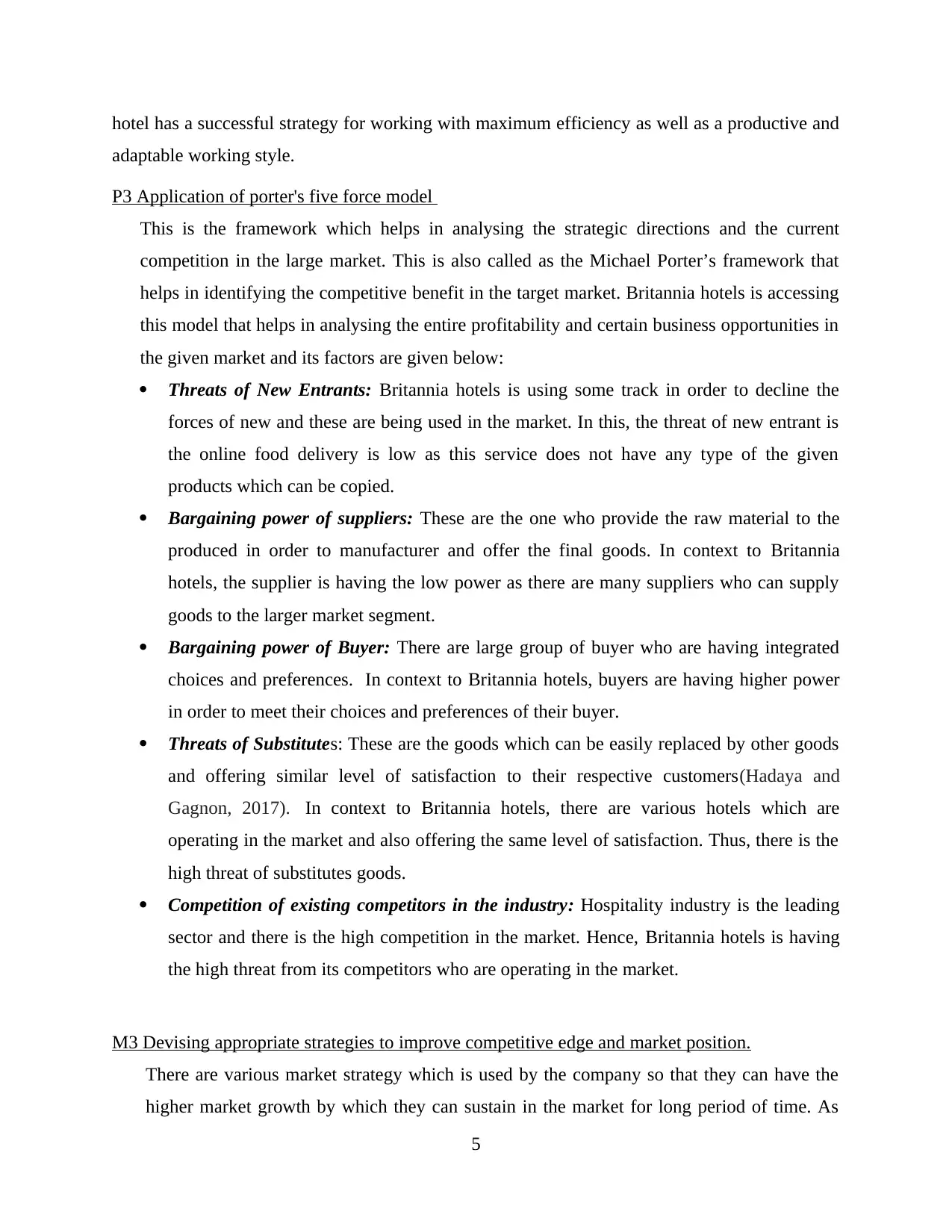
hotel has a successful strategy for working with maximum efficiency as well as a productive and
adaptable working style.
P3 Application of porter's five force model
This is the framework which helps in analysing the strategic directions and the current
competition in the large market. This is also called as the Michael Porter’s framework that
helps in identifying the competitive benefit in the target market. Britannia hotels is accessing
this model that helps in analysing the entire profitability and certain business opportunities in
the given market and its factors are given below:
Threats of New Entrants: Britannia hotels is using some track in order to decline the
forces of new and these are being used in the market. In this, the threat of new entrant is
the online food delivery is low as this service does not have any type of the given
products which can be copied.
Bargaining power of suppliers: These are the one who provide the raw material to the
produced in order to manufacturer and offer the final goods. In context to Britannia
hotels, the supplier is having the low power as there are many suppliers who can supply
goods to the larger market segment.
Bargaining power of Buyer: There are large group of buyer who are having integrated
choices and preferences. In context to Britannia hotels, buyers are having higher power
in order to meet their choices and preferences of their buyer.
Threats of Substitutes: These are the goods which can be easily replaced by other goods
and offering similar level of satisfaction to their respective customers(Hadaya and
Gagnon, 2017). In context to Britannia hotels, there are various hotels which are
operating in the market and also offering the same level of satisfaction. Thus, there is the
high threat of substitutes goods.
Competition of existing competitors in the industry: Hospitality industry is the leading
sector and there is the high competition in the market. Hence, Britannia hotels is having
the high threat from its competitors who are operating in the market.
M3 Devising appropriate strategies to improve competitive edge and market position.
There are various market strategy which is used by the company so that they can have the
higher market growth by which they can sustain in the market for long period of time. As
5
adaptable working style.
P3 Application of porter's five force model
This is the framework which helps in analysing the strategic directions and the current
competition in the large market. This is also called as the Michael Porter’s framework that
helps in identifying the competitive benefit in the target market. Britannia hotels is accessing
this model that helps in analysing the entire profitability and certain business opportunities in
the given market and its factors are given below:
Threats of New Entrants: Britannia hotels is using some track in order to decline the
forces of new and these are being used in the market. In this, the threat of new entrant is
the online food delivery is low as this service does not have any type of the given
products which can be copied.
Bargaining power of suppliers: These are the one who provide the raw material to the
produced in order to manufacturer and offer the final goods. In context to Britannia
hotels, the supplier is having the low power as there are many suppliers who can supply
goods to the larger market segment.
Bargaining power of Buyer: There are large group of buyer who are having integrated
choices and preferences. In context to Britannia hotels, buyers are having higher power
in order to meet their choices and preferences of their buyer.
Threats of Substitutes: These are the goods which can be easily replaced by other goods
and offering similar level of satisfaction to their respective customers(Hadaya and
Gagnon, 2017). In context to Britannia hotels, there are various hotels which are
operating in the market and also offering the same level of satisfaction. Thus, there is the
high threat of substitutes goods.
Competition of existing competitors in the industry: Hospitality industry is the leading
sector and there is the high competition in the market. Hence, Britannia hotels is having
the high threat from its competitors who are operating in the market.
M3 Devising appropriate strategies to improve competitive edge and market position.
There are various market strategy which is used by the company so that they can have the
higher market growth by which they can sustain in the market for long period of time. As
5
Paraphrase This Document
Need a fresh take? Get an instant paraphrase of this document with our AI Paraphraser
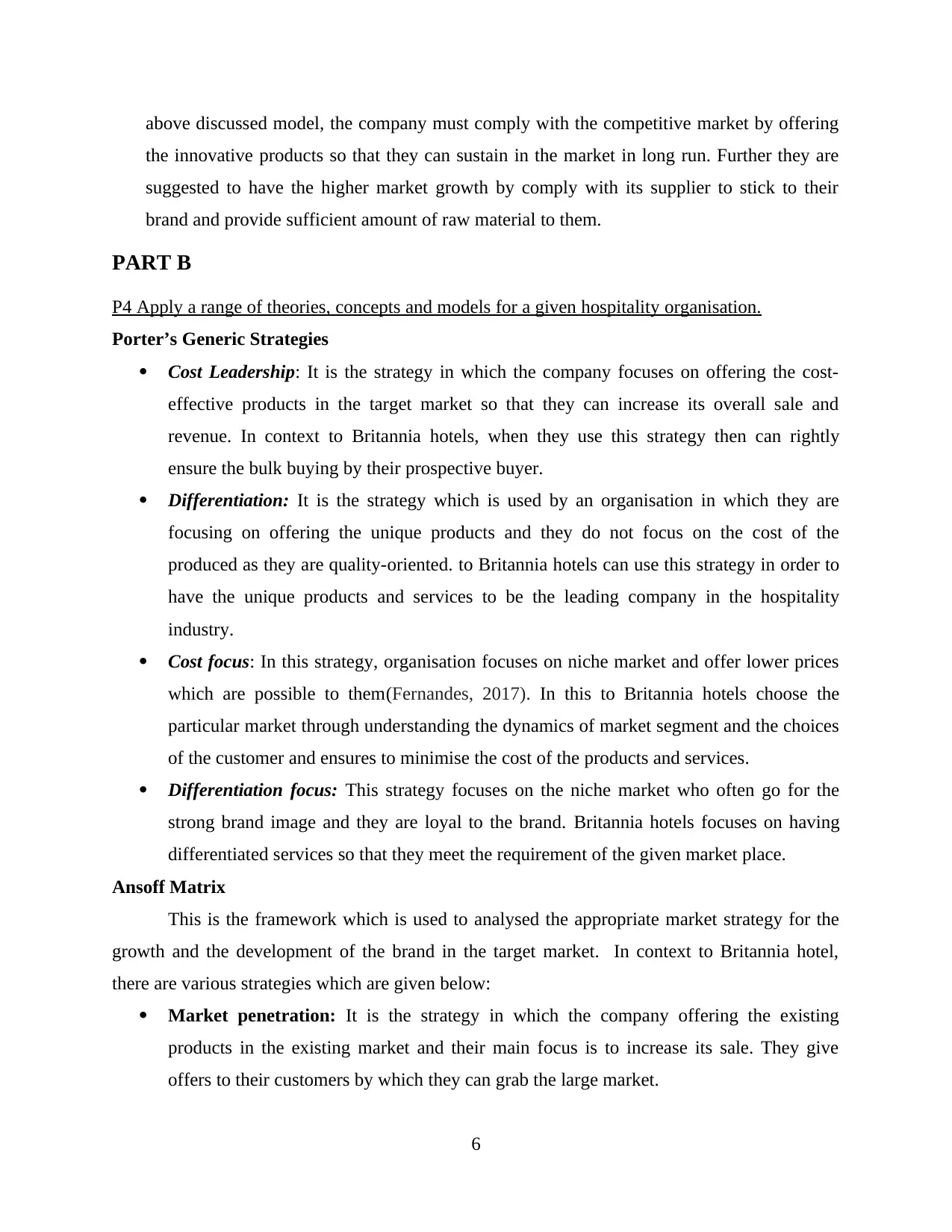
above discussed model, the company must comply with the competitive market by offering
the innovative products so that they can sustain in the market in long run. Further they are
suggested to have the higher market growth by comply with its supplier to stick to their
brand and provide sufficient amount of raw material to them.
PART B
P4 Apply a range of theories, concepts and models for a given hospitality organisation.
Porter’s Generic Strategies
Cost Leadership: It is the strategy in which the company focuses on offering the cost-
effective products in the target market so that they can increase its overall sale and
revenue. In context to Britannia hotels, when they use this strategy then can rightly
ensure the bulk buying by their prospective buyer.
Differentiation: It is the strategy which is used by an organisation in which they are
focusing on offering the unique products and they do not focus on the cost of the
produced as they are quality-oriented. to Britannia hotels can use this strategy in order to
have the unique products and services to be the leading company in the hospitality
industry.
Cost focus: In this strategy, organisation focuses on niche market and offer lower prices
which are possible to them(Fernandes, 2017). In this to Britannia hotels choose the
particular market through understanding the dynamics of market segment and the choices
of the customer and ensures to minimise the cost of the products and services.
Differentiation focus: This strategy focuses on the niche market who often go for the
strong brand image and they are loyal to the brand. Britannia hotels focuses on having
differentiated services so that they meet the requirement of the given market place.
Ansoff Matrix
This is the framework which is used to analysed the appropriate market strategy for the
growth and the development of the brand in the target market. In context to Britannia hotel,
there are various strategies which are given below:
Market penetration: It is the strategy in which the company offering the existing
products in the existing market and their main focus is to increase its sale. They give
offers to their customers by which they can grab the large market.
6
the innovative products so that they can sustain in the market in long run. Further they are
suggested to have the higher market growth by comply with its supplier to stick to their
brand and provide sufficient amount of raw material to them.
PART B
P4 Apply a range of theories, concepts and models for a given hospitality organisation.
Porter’s Generic Strategies
Cost Leadership: It is the strategy in which the company focuses on offering the cost-
effective products in the target market so that they can increase its overall sale and
revenue. In context to Britannia hotels, when they use this strategy then can rightly
ensure the bulk buying by their prospective buyer.
Differentiation: It is the strategy which is used by an organisation in which they are
focusing on offering the unique products and they do not focus on the cost of the
produced as they are quality-oriented. to Britannia hotels can use this strategy in order to
have the unique products and services to be the leading company in the hospitality
industry.
Cost focus: In this strategy, organisation focuses on niche market and offer lower prices
which are possible to them(Fernandes, 2017). In this to Britannia hotels choose the
particular market through understanding the dynamics of market segment and the choices
of the customer and ensures to minimise the cost of the products and services.
Differentiation focus: This strategy focuses on the niche market who often go for the
strong brand image and they are loyal to the brand. Britannia hotels focuses on having
differentiated services so that they meet the requirement of the given market place.
Ansoff Matrix
This is the framework which is used to analysed the appropriate market strategy for the
growth and the development of the brand in the target market. In context to Britannia hotel,
there are various strategies which are given below:
Market penetration: It is the strategy in which the company offering the existing
products in the existing market and their main focus is to increase its sale. They give
offers to their customers by which they can grab the large market.
6
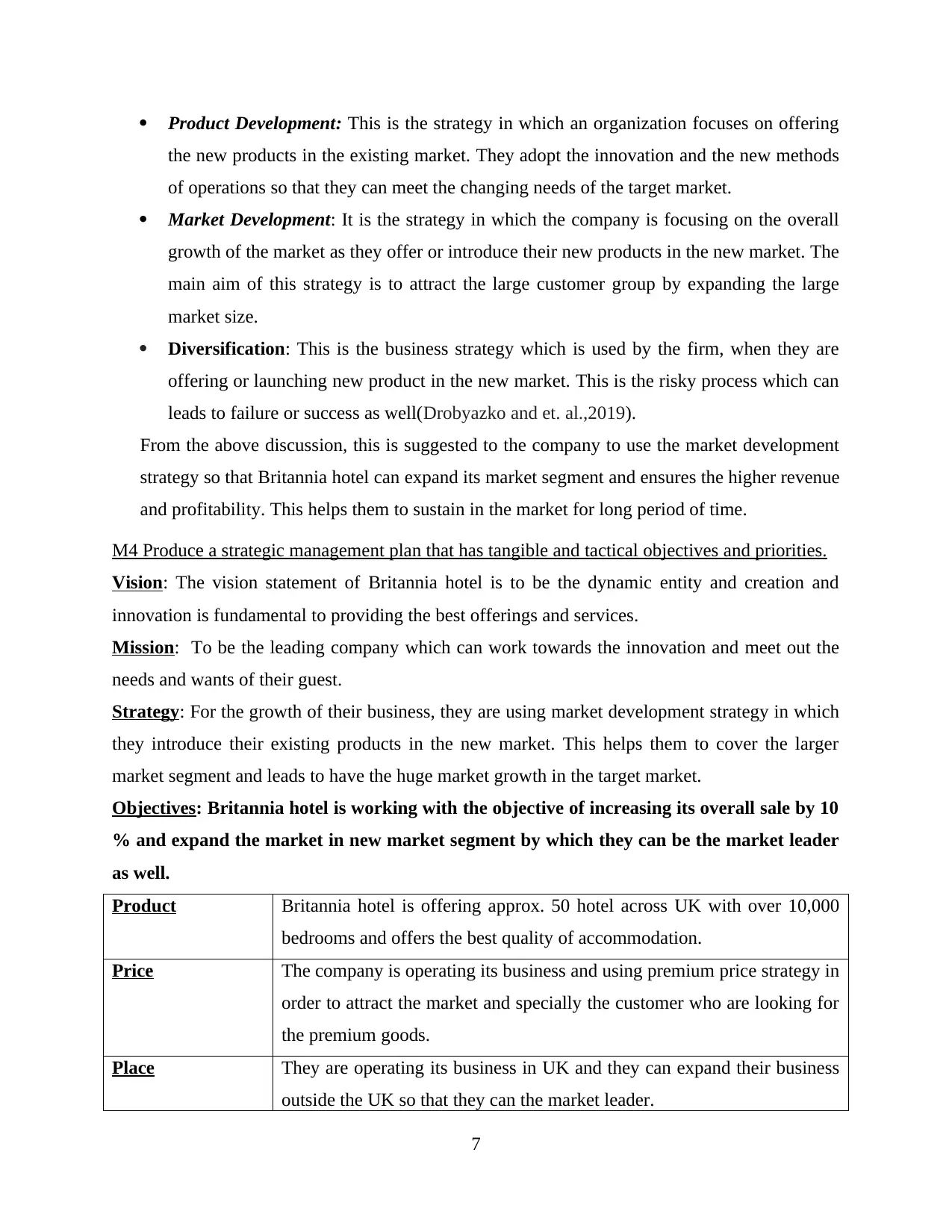
Product Development: This is the strategy in which an organization focuses on offering
the new products in the existing market. They adopt the innovation and the new methods
of operations so that they can meet the changing needs of the target market.
Market Development: It is the strategy in which the company is focusing on the overall
growth of the market as they offer or introduce their new products in the new market. The
main aim of this strategy is to attract the large customer group by expanding the large
market size.
Diversification: This is the business strategy which is used by the firm, when they are
offering or launching new product in the new market. This is the risky process which can
leads to failure or success as well(Drobyazko and et. al.,2019).
From the above discussion, this is suggested to the company to use the market development
strategy so that Britannia hotel can expand its market segment and ensures the higher revenue
and profitability. This helps them to sustain in the market for long period of time.
M4 Produce a strategic management plan that has tangible and tactical objectives and priorities.
Vision: The vision statement of Britannia hotel is to be the dynamic entity and creation and
innovation is fundamental to providing the best offerings and services.
Mission: To be the leading company which can work towards the innovation and meet out the
needs and wants of their guest.
Strategy: For the growth of their business, they are using market development strategy in which
they introduce their existing products in the new market. This helps them to cover the larger
market segment and leads to have the huge market growth in the target market.
Objectives: Britannia hotel is working with the objective of increasing its overall sale by 10
% and expand the market in new market segment by which they can be the market leader
as well.
Product Britannia hotel is offering approx. 50 hotel across UK with over 10,000
bedrooms and offers the best quality of accommodation.
Price The company is operating its business and using premium price strategy in
order to attract the market and specially the customer who are looking for
the premium goods.
Place They are operating its business in UK and they can expand their business
outside the UK so that they can the market leader.
7
the new products in the existing market. They adopt the innovation and the new methods
of operations so that they can meet the changing needs of the target market.
Market Development: It is the strategy in which the company is focusing on the overall
growth of the market as they offer or introduce their new products in the new market. The
main aim of this strategy is to attract the large customer group by expanding the large
market size.
Diversification: This is the business strategy which is used by the firm, when they are
offering or launching new product in the new market. This is the risky process which can
leads to failure or success as well(Drobyazko and et. al.,2019).
From the above discussion, this is suggested to the company to use the market development
strategy so that Britannia hotel can expand its market segment and ensures the higher revenue
and profitability. This helps them to sustain in the market for long period of time.
M4 Produce a strategic management plan that has tangible and tactical objectives and priorities.
Vision: The vision statement of Britannia hotel is to be the dynamic entity and creation and
innovation is fundamental to providing the best offerings and services.
Mission: To be the leading company which can work towards the innovation and meet out the
needs and wants of their guest.
Strategy: For the growth of their business, they are using market development strategy in which
they introduce their existing products in the new market. This helps them to cover the larger
market segment and leads to have the huge market growth in the target market.
Objectives: Britannia hotel is working with the objective of increasing its overall sale by 10
% and expand the market in new market segment by which they can be the market leader
as well.
Product Britannia hotel is offering approx. 50 hotel across UK with over 10,000
bedrooms and offers the best quality of accommodation.
Price The company is operating its business and using premium price strategy in
order to attract the market and specially the customer who are looking for
the premium goods.
Place They are operating its business in UK and they can expand their business
outside the UK so that they can the market leader.
7
⊘ This is a preview!⊘
Do you want full access?
Subscribe today to unlock all pages.

Trusted by 1+ million students worldwide
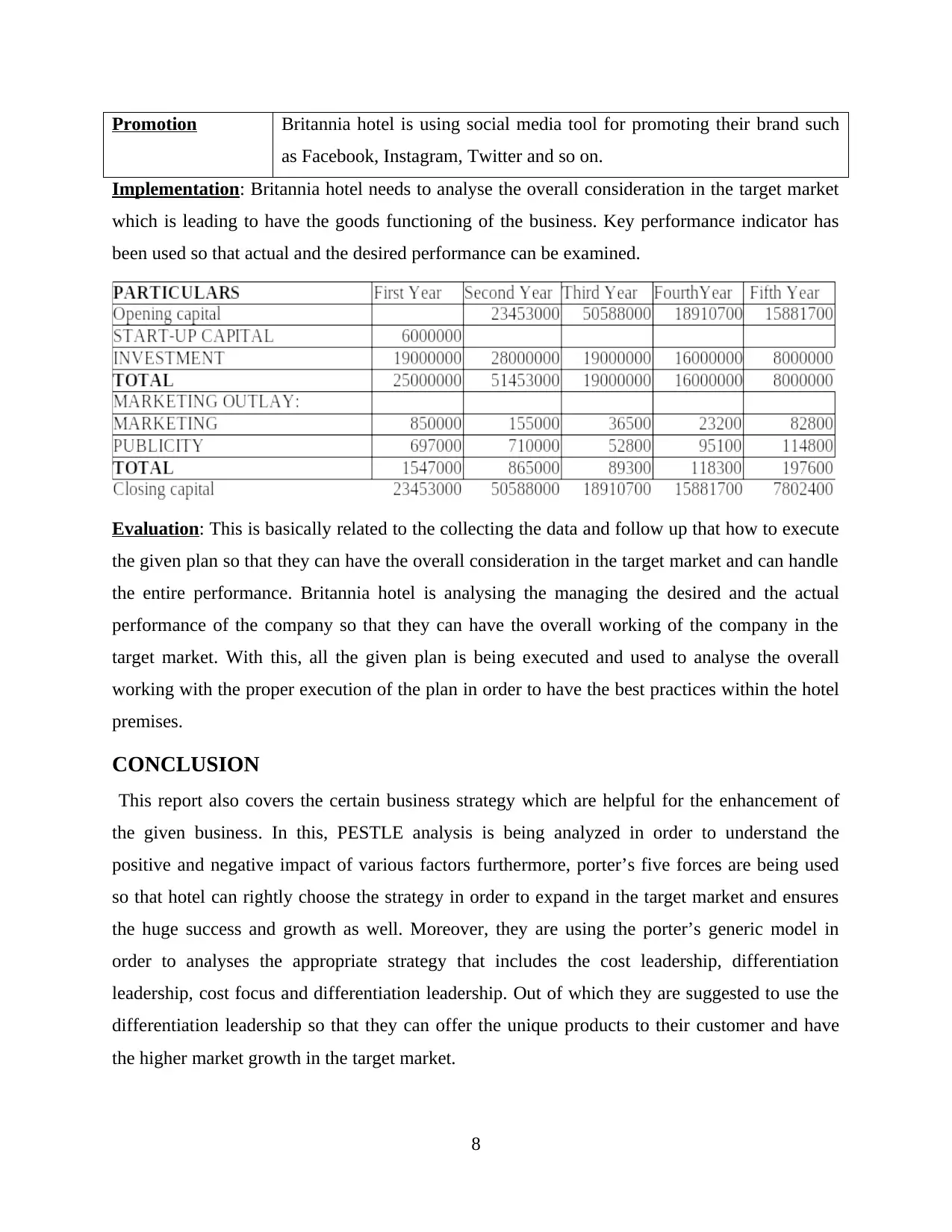
Promotion Britannia hotel is using social media tool for promoting their brand such
as Facebook, Instagram, Twitter and so on.
Implementation: Britannia hotel needs to analyse the overall consideration in the target market
which is leading to have the goods functioning of the business. Key performance indicator has
been used so that actual and the desired performance can be examined.
Evaluation: This is basically related to the collecting the data and follow up that how to execute
the given plan so that they can have the overall consideration in the target market and can handle
the entire performance. Britannia hotel is analysing the managing the desired and the actual
performance of the company so that they can have the overall working of the company in the
target market. With this, all the given plan is being executed and used to analyse the overall
working with the proper execution of the plan in order to have the best practices within the hotel
premises.
CONCLUSION
This report also covers the certain business strategy which are helpful for the enhancement of
the given business. In this, PESTLE analysis is being analyzed in order to understand the
positive and negative impact of various factors furthermore, porter’s five forces are being used
so that hotel can rightly choose the strategy in order to expand in the target market and ensures
the huge success and growth as well. Moreover, they are using the porter’s generic model in
order to analyses the appropriate strategy that includes the cost leadership, differentiation
leadership, cost focus and differentiation leadership. Out of which they are suggested to use the
differentiation leadership so that they can offer the unique products to their customer and have
the higher market growth in the target market.
8
as Facebook, Instagram, Twitter and so on.
Implementation: Britannia hotel needs to analyse the overall consideration in the target market
which is leading to have the goods functioning of the business. Key performance indicator has
been used so that actual and the desired performance can be examined.
Evaluation: This is basically related to the collecting the data and follow up that how to execute
the given plan so that they can have the overall consideration in the target market and can handle
the entire performance. Britannia hotel is analysing the managing the desired and the actual
performance of the company so that they can have the overall working of the company in the
target market. With this, all the given plan is being executed and used to analyse the overall
working with the proper execution of the plan in order to have the best practices within the hotel
premises.
CONCLUSION
This report also covers the certain business strategy which are helpful for the enhancement of
the given business. In this, PESTLE analysis is being analyzed in order to understand the
positive and negative impact of various factors furthermore, porter’s five forces are being used
so that hotel can rightly choose the strategy in order to expand in the target market and ensures
the huge success and growth as well. Moreover, they are using the porter’s generic model in
order to analyses the appropriate strategy that includes the cost leadership, differentiation
leadership, cost focus and differentiation leadership. Out of which they are suggested to use the
differentiation leadership so that they can offer the unique products to their customer and have
the higher market growth in the target market.
8
Paraphrase This Document
Need a fresh take? Get an instant paraphrase of this document with our AI Paraphraser
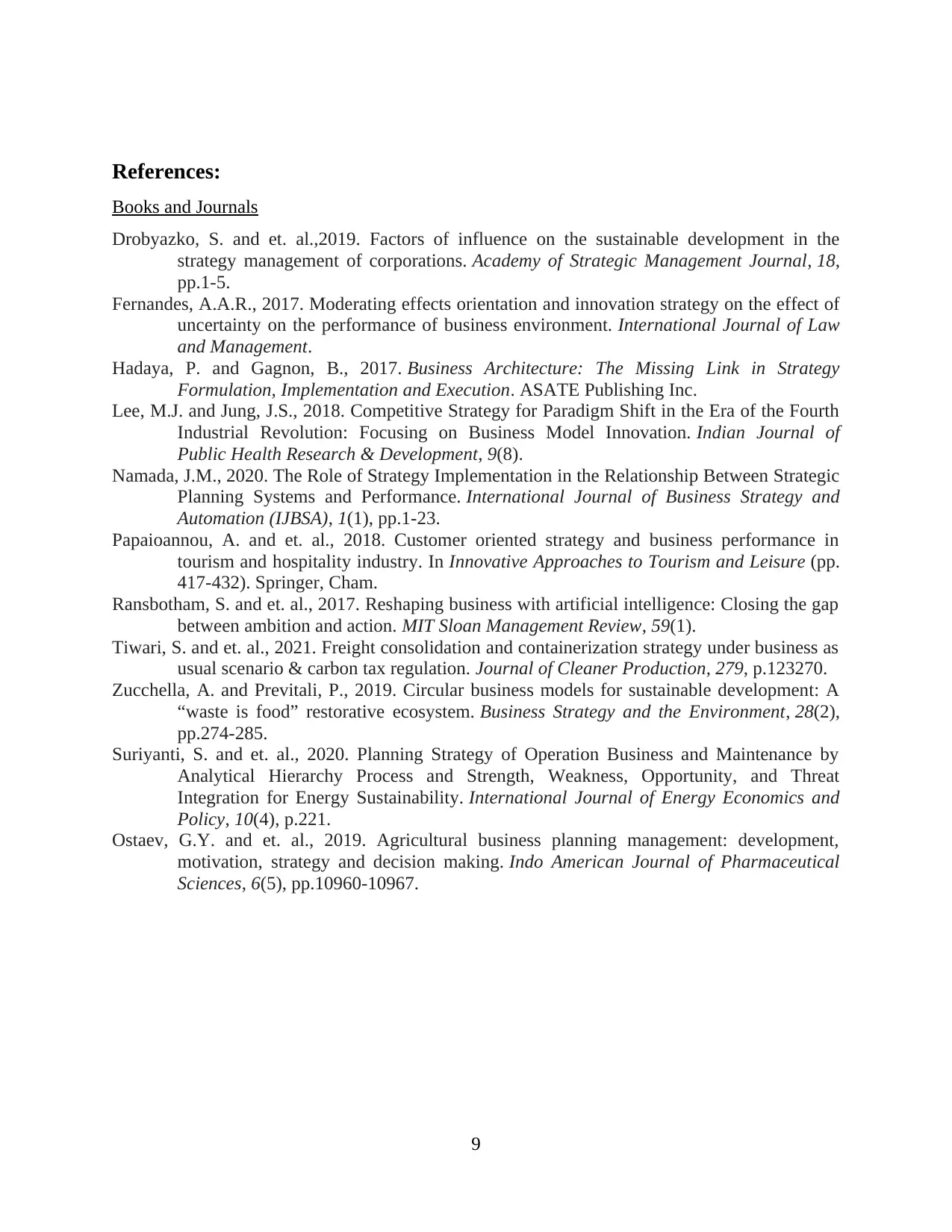
References:
Books and Journals
Drobyazko, S. and et. al.,2019. Factors of influence on the sustainable development in the
strategy management of corporations. Academy of Strategic Management Journal, 18,
pp.1-5.
Fernandes, A.A.R., 2017. Moderating effects orientation and innovation strategy on the effect of
uncertainty on the performance of business environment. International Journal of Law
and Management.
Hadaya, P. and Gagnon, B., 2017. Business Architecture: The Missing Link in Strategy
Formulation, Implementation and Execution. ASATE Publishing Inc.
Lee, M.J. and Jung, J.S., 2018. Competitive Strategy for Paradigm Shift in the Era of the Fourth
Industrial Revolution: Focusing on Business Model Innovation. Indian Journal of
Public Health Research & Development, 9(8).
Namada, J.M., 2020. The Role of Strategy Implementation in the Relationship Between Strategic
Planning Systems and Performance. International Journal of Business Strategy and
Automation (IJBSA), 1(1), pp.1-23.
Papaioannou, A. and et. al., 2018. Customer oriented strategy and business performance in
tourism and hospitality industry. In Innovative Approaches to Tourism and Leisure (pp.
417-432). Springer, Cham.
Ransbotham, S. and et. al., 2017. Reshaping business with artificial intelligence: Closing the gap
between ambition and action. MIT Sloan Management Review, 59(1).
Tiwari, S. and et. al., 2021. Freight consolidation and containerization strategy under business as
usual scenario & carbon tax regulation. Journal of Cleaner Production, 279, p.123270.
Zucchella, A. and Previtali, P., 2019. Circular business models for sustainable development: A
“waste is food” restorative ecosystem. Business Strategy and the Environment, 28(2),
pp.274-285.
Suriyanti, S. and et. al., 2020. Planning Strategy of Operation Business and Maintenance by
Analytical Hierarchy Process and Strength, Weakness, Opportunity, and Threat
Integration for Energy Sustainability. International Journal of Energy Economics and
Policy, 10(4), p.221.
Ostaev, G.Y. and et. al., 2019. Agricultural business planning management: development,
motivation, strategy and decision making. Indo American Journal of Pharmaceutical
Sciences, 6(5), pp.10960-10967.
9
Books and Journals
Drobyazko, S. and et. al.,2019. Factors of influence on the sustainable development in the
strategy management of corporations. Academy of Strategic Management Journal, 18,
pp.1-5.
Fernandes, A.A.R., 2017. Moderating effects orientation and innovation strategy on the effect of
uncertainty on the performance of business environment. International Journal of Law
and Management.
Hadaya, P. and Gagnon, B., 2017. Business Architecture: The Missing Link in Strategy
Formulation, Implementation and Execution. ASATE Publishing Inc.
Lee, M.J. and Jung, J.S., 2018. Competitive Strategy for Paradigm Shift in the Era of the Fourth
Industrial Revolution: Focusing on Business Model Innovation. Indian Journal of
Public Health Research & Development, 9(8).
Namada, J.M., 2020. The Role of Strategy Implementation in the Relationship Between Strategic
Planning Systems and Performance. International Journal of Business Strategy and
Automation (IJBSA), 1(1), pp.1-23.
Papaioannou, A. and et. al., 2018. Customer oriented strategy and business performance in
tourism and hospitality industry. In Innovative Approaches to Tourism and Leisure (pp.
417-432). Springer, Cham.
Ransbotham, S. and et. al., 2017. Reshaping business with artificial intelligence: Closing the gap
between ambition and action. MIT Sloan Management Review, 59(1).
Tiwari, S. and et. al., 2021. Freight consolidation and containerization strategy under business as
usual scenario & carbon tax regulation. Journal of Cleaner Production, 279, p.123270.
Zucchella, A. and Previtali, P., 2019. Circular business models for sustainable development: A
“waste is food” restorative ecosystem. Business Strategy and the Environment, 28(2),
pp.274-285.
Suriyanti, S. and et. al., 2020. Planning Strategy of Operation Business and Maintenance by
Analytical Hierarchy Process and Strength, Weakness, Opportunity, and Threat
Integration for Energy Sustainability. International Journal of Energy Economics and
Policy, 10(4), p.221.
Ostaev, G.Y. and et. al., 2019. Agricultural business planning management: development,
motivation, strategy and decision making. Indo American Journal of Pharmaceutical
Sciences, 6(5), pp.10960-10967.
9
1 out of 11
Related Documents
Your All-in-One AI-Powered Toolkit for Academic Success.
+13062052269
info@desklib.com
Available 24*7 on WhatsApp / Email
![[object Object]](/_next/static/media/star-bottom.7253800d.svg)
Unlock your academic potential
Copyright © 2020–2026 A2Z Services. All Rights Reserved. Developed and managed by ZUCOL.

